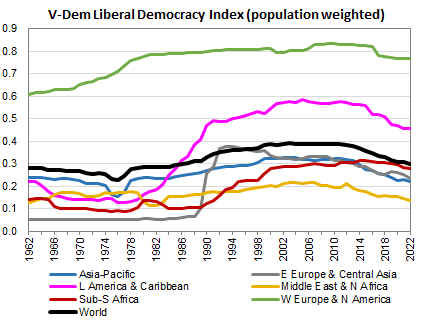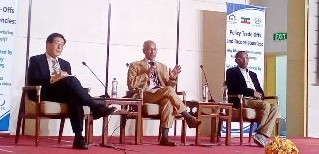|
|
Prof. K. Ohno's Homepage
Office: E410 email
profile Updated August 3, 2023 |
|
|
Economic Development of Japan All sessions completed for Spring 2023. syllabus textbook (free download)
|
Policy Design and Implementation in Developing
Countries All sessions completed for Spring 2023. |
|
Additional materials for EDJ course - Matsukata
Deflation Also see Q&A section at the end of the assigned textbook. Over the years, I have collected questions raised by students and recorded some of them with my answers.
K. Ohno on Japan's post-WW2
recovery and high growth: |
Industrial studies & reports
Technology transfer of Meiji
Japan (Uchida) Mission reports on industrial policy |
|
Topics
I delivered three lectures to undergrad and graduate students at National Economics University in Hanoi (November 2022) and one lecture to undergrads at Thai Binh Duong University in Nha Trang (March 2023). Topics covered Vietnam's economic position in Asia, middle income traps, the importance of a national leader and economic technocrats, and how various governments formulate development policies. Vietnam has done greatly in the last few decades rising from poverty to middle income, but significant policy reform is needed if the country wants to attain high income. Vietnam is very dynamic despite its many problems. Young people in Vietnam may be satisfied with the current status but may want to make accelerated effort to aim higher. Which attitude is the right one? It is up to them.
I have been working with two GRIPS PhD alumni to produce national productivity reports in Ethiopia and Vietnam. Dr. Kidanemariam Berhe Hailu is lead researcher at Policy Studies Institute (Addis Ababa) and Dr. Nguyen Duc Thanh is president of Viet Nam Center for Economic and Strategic Studies (Hanoi). They both studied under my supervision. Though the two countries are at different development stages and face different problems, they both need analytical and reliable information on productivity for policy making. To ensure high-quality research, I advised their data collection and cleaning, labor productivity decomposition, shift-share analysis, firm survey, etc. Results were presented to high-level national audience as well as at the World Bank headquarters, and received positive responses. The Ethiopian report was completed in 2020 and the Vietnamese report was launched in April 2021. Ethiopia Productivity Report (2020) Vietnam Productivity Report (2021) Separately, FDI Policy Report was also produced jointly with PSI, the Ethiopian think tank, and launched in January 2022. Ethiopia FDI Policy Report (2022)
GDF interviewed Japanese auto makers, visited many developing countries that produce cars, analyzed auto tariff structures globally, and carefully compared the policies of Kenya and Ethiopia to come up with pragmatic policy advice to invite global car giants to Ethiopia. The results were reported to Ethiopian leaders and industrial officials, and recommendations will be followed up with action. In Ethiopia, barriers that need to be overcome are (i) foreign currency shortage; (ii) incentive problems; (iIi) used car import; and (iv) small demand. slides
Izumi & Kenichi Ohno contributed a chapter to the recently released Oxford Handbook of the Ethiopian Economy (OUP 2019). We explained how Ethiopia has learned from East Asia, especially Japan, and how GRIPS and JICA have conducted bilateral industrial policy dialogue since 2008. The GRIPS Development Forum has exchanged many policy issues with PM Meles (2008-12) and PM Hailemariam (2013-17). We are re-establishing working relations with the new policy teams of PM Abiy Ahmed who came to power in April 2018, to continue Japan's industrial cooperation. book website |
|

 I
wrote an article in the Analysis Column of Nikkei Newspaper on June 7,
2023. I argue that the world is now in
the Post Post-Cold War period where the US leadership and democracy have
weakened. Developing countries respond to this new situation by (i)
joining and leaving various events and regimes conditionally and flexibly
whether it is One Belt One Road, Free & Open Indo-Pacific, a specific
UN resolution, etc.; (ii) dynamic South group formation (incl. Global South)
to protest against the world ruled by advanced countries; and
(iii) increased despotism without generating economic growth; despotism is on the rise thanks to the fierce competition among multiple hegemon candidates. The V-Dem Institute's Liberal
Democracy Index shows a declining trend of democracy in all regions during
the 2010s
and 20s.
I
wrote an article in the Analysis Column of Nikkei Newspaper on June 7,
2023. I argue that the world is now in
the Post Post-Cold War period where the US leadership and democracy have
weakened. Developing countries respond to this new situation by (i)
joining and leaving various events and regimes conditionally and flexibly
whether it is One Belt One Road, Free & Open Indo-Pacific, a specific
UN resolution, etc.; (ii) dynamic South group formation (incl. Global South)
to protest against the world ruled by advanced countries; and
(iii) increased despotism without generating economic growth; despotism is on the rise thanks to the fierce competition among multiple hegemon candidates. The V-Dem Institute's Liberal
Democracy Index shows a declining trend of democracy in all regions during
the 2010s
and 20s. Ethiopian
MOI Minister Melaku asked the GRIPS policy dialogue team to arrange a
workshop on why inter-ministerial coordination fails and how it can be
remedied from international experience. Governments usually want advice on
what to do but a request for the analysis of their failure was an
interesting and bold one. GRIPS, JICA and PSI (Ethiopian think tank)
jointly organized an open workshop in Addis Ababa on December 15, 2022.
After identifying the coordination problems of the Ethiopian government,
our team presented many cases of how coordination problems were resolved
in East Asia. While solutions are many, the most important thing is the
quality of national leaders and economic technocrats who implement them.
This was the last workshop we hosted in Phase 3 of Ethiopia-Japan
Industrial Policy Dialogue.
Ethiopian
MOI Minister Melaku asked the GRIPS policy dialogue team to arrange a
workshop on why inter-ministerial coordination fails and how it can be
remedied from international experience. Governments usually want advice on
what to do but a request for the analysis of their failure was an
interesting and bold one. GRIPS, JICA and PSI (Ethiopian think tank)
jointly organized an open workshop in Addis Ababa on December 15, 2022.
After identifying the coordination problems of the Ethiopian government,
our team presented many cases of how coordination problems were resolved
in East Asia. While solutions are many, the most important thing is the
quality of national leaders and economic technocrats who implement them.
This was the last workshop we hosted in Phase 3 of Ethiopia-Japan
Industrial Policy Dialogue. Kenichi Ohno and Arkebe Oqubay, an Ethiopian
minister at PM Office, published an edited volume, How Nations Learn:
Technology Learning, Industrial Policy and Catch-up (OUP, June 2019).
Renowned researchers examine key features of successful industrialization,
state's role in catch-up and innovation, and cases from Asia, Africa and
Latin America with particular emphasis on HOW policies are made and
executed, not just WHAT are done. This book is another offshoot from the
Ethiopia-Japan Industrial Policy Dialogue.
Kenichi Ohno and Arkebe Oqubay, an Ethiopian
minister at PM Office, published an edited volume, How Nations Learn:
Technology Learning, Industrial Policy and Catch-up (OUP, June 2019).
Renowned researchers examine key features of successful industrialization,
state's role in catch-up and innovation, and cases from Asia, Africa and
Latin America with particular emphasis on HOW policies are made and
executed, not just WHAT are done. This book is another offshoot from the
Ethiopia-Japan Industrial Policy Dialogue.